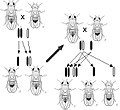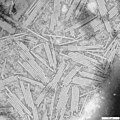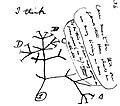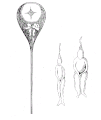Portal:Biology
Introduction


Biology is the scientific study of life. It is a natural science with a broad scope but has several unifying themes that tie it together as a single, coherent field. For instance, all organisms are composed of at least one cell that processes hereditary information encoded in genes, which can be transmitted to future generations. Another major theme is evolution, which explains the unity and diversity of life. Energy processing is also important to life as it allows organisms to move, grow, and reproduce. Finally, all organisms can regulate their own internal environments.
Biologists can study life at multiple levels of organization, from the molecular biology of a cell to the anatomy and physiology of plants and animals, and the evolution of populations. Hence, there are multiple subdisciplines within biology, each defined by the nature of their research questions and the tools that they use. Like other scientists, biologists use the scientific method to make observations, pose questions, generate hypotheses, perform experiments, and form conclusions about the world around them.
Life on Earth, which emerged over 3.7 billion years ago, is immensely diverse. Biologists have sought to study and classify the various life form, from prokaryotic organisms such as archaea and bacteria to eukaryotic organisms such as protists, fungi, plants, and animals. These organisms contribute to the biodiversity of an ecosystem, where they play specialized roles in the cycling of nutrients and energy through their biophysical environment. (Full article...)
Selected article -

Natural selection is the differential survival and reproduction of individuals due to differences in phenotype. It is a key mechanism of evolution, the change in the heritable traits characteristic of a population over generations. Charles Darwin popularised the term "natural selection", contrasting it with artificial selection, which is intentional, whereas natural selection is not.
Variation of traits, both genotypic and phenotypic, exists within all populations of organisms. However, some traits are more likely to facilitate survival and reproductive success. Thus, these traits are passed on to the next generation. These traits can also become more common within a population if the environment that favours these traits remains fixed. If new traits become more favoured due to changes in a specific niche, microevolution occurs. If new traits become more favoured due to changes in the broader environment, macroevolution occurs. Sometimes, new species can arise especially if these new traits are radically different from the traits possessed by their predecessors. (Full article...)
Selected picture -

Major topics
Selected biography -
Dame Jane Morris Goodall DBE (/ˈɡʊdɔːl/; born Valerie Jane Morris-Goodall; 3 April 1934), formerly Baroness Jane van Lawick-Goodall, is an English zoologist, primatologist and anthropologist. She is considered the world's foremost expert on chimpanzees, after 60 years' studying the social and family interactions of wild chimpanzees. Goodall first went to Gombe Stream National Park in Tanzania to observe its chimpanzees in 1960.
She is the founder of the Jane Goodall Institute and the Roots & Shoots programme and has worked extensively on conservation and animal welfare issues. As of 2022, she is on the board of the Nonhuman Rights Project. In April 2002, she was named a United Nations Messenger of Peace. Goodall is an honorary member of the World Future Council. (Full article...)
General images -
Did you know -
- ... that seeds of the fossil fruit Suciacarpa have fossil fungi inside them?
- ... that the fossil ant genus Agastomyrma was described from a single queen, and males of the fossil ant Proceratium eocenicum have a hair fringe?
- ... that less than 50 years after being discovered, Heterelmis stephani is now presumed extinct?
- ... that in 1981 Bobbi Campbell became the first person to publicly identify as a person living with HIV/AIDS?
Things you can do
Related portals
Biology portals
Categories

Anatomy - Anthropology - Astrobiology - Biochemistry - Bioengineering - Bioinformatics - Biotechnology - Botany - Cell biology - Conservation biology - Developmental biology - Ecology - Environmental science - Evolutionary biology - Genetics - Mathematical biology - Medicine - Microbiology - Immunology - Molecular biology - Mycology - Neuroscience - Paleontology - Palynology Parasitology - Pharmacology -
Phylogenetics - Physiology - Systems biology - Taxonomy - Toxicology - Virology - ZoologyMore topics
WikiProjects

WikiProjects connected with biology:
A complete list of scientific WikiProjects can be found here. See also Wikispecies, a Wikimedia project dedicated to classification of biological species.
Associated Wikimedia
The following Wikimedia Foundation sister projects provide more on this subject:
-
Commons
Free media repository -
Wikibooks
Free textbooks and manuals -
Wikidata
Free knowledge base -
Wikinews
Free-content news -
Wikiquote
Collection of quotations -
Wikisource
Free-content library -
Wikiversity
Free learning tools -
Wiktionary
Dictionary and thesaurus


























































